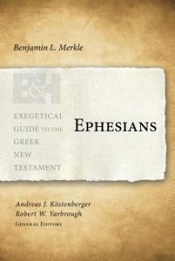 The Exegetical Guide to the Greek New Testament series (EGGNT) has recently added the next installment on Ephesians by Benjamin L. Merkle. Merkle is a professor of New Testament and Greek at Southeastern Baptist Theological Seminary in Wake Forest, NC and is the editor of their journal Southeastern Theological Review.
The Exegetical Guide to the Greek New Testament series (EGGNT) has recently added the next installment on Ephesians by Benjamin L. Merkle. Merkle is a professor of New Testament and Greek at Southeastern Baptist Theological Seminary in Wake Forest, NC and is the editor of their journal Southeastern Theological Review.
Series Summary
The commentary is solely based on the Greek of the New Testament primarily using the fifth edition of the United Bible Societies’ Greek New Testament. The book divides Ephesians into pericopes by its Greek text, block diagrams, exegetes phrase-by-phrase, and gives a rationale for the translation given along with some detailed discussion of pertinent issues within each pericope. A good grasp of New Testament Greek is required to benefit from this book as well as an ability to understand the grammatical abbreviations used in the book.
As a guide, the reader is presented with a number of helps in their own study of the Greek text. The purpose of the book is not to do all of the work for the reader, but, rather, to “provide all the necessary information for understanding the Greek text.” Having a lot of the time consuming work done for you helps the reader to focus more on interpreting the information and developing the sermon. By breaking the book up into pericopes the reader already has a good idea as to how to lay out their sermons. There are suggested homoletical outlines (often giving more than one) as well as suggested further reading based on the subject matter of each verse or group of verses examined. When more than one suggestion is offered by commentators Merkle presents them along with his reasons for which one seems to fit the text best.
Ephesians Summary
Since this is not a full blown commentary there is little discussion on the typical introductory material you would find in commentaries. Merkle presents the arguments for and against Pauline authorship, the various dates proposed for the writing of the epistle, arguments for and against the superscription “to the Ephesians” as a destination marker, a rationale for the occasion and purpose of the letter (six of them to be exact), and finally a proposed outline of the book followed by a list of recommend commentaries. In light of the recent discussion concerning Peter O’Brien’s commentaries, readers will be interested to know that Merkle regards his Pillar commentary on Ephesians to be “the best overall commentary that is both academically informed and broadly accessible.” (9) There are varying opinions about the merits of accusing O’Brien of plagiarism. I am not yet convinced the accusations are warranted so I do not feel it should be a mark against Merkle’s work that he relies upon and highly recommends O’Brien’s book.
A good example of how Merkle, and the series in general, treats certain highly theological texts is Ephesians 2:8, “For on the basis of grace you are saved by faith.” (authors translation) You will immediately notice the differences in Merkel’s translation depending on which translation you have memorized (like the ESV). There are three translation issues in this verse but I will just examine two of them. τῇ γáρ χάριτί is usually translated as “by grace” which sees it as a dative of means. Merkle argues that it should be translated as a dative of cause and thus read “because of grace” or “on the basis of grace.” This in turn impacts how Merkle translates διà πίστεως as a dative of cause and thus “by grace”. Merkle notes, “A dat. of cause indicates the why or basis of something whereas a dat. of means indicates the how or method by which something is performed.” (61) This leads him to see that “the ref. to faith clearly refers to the faith of the believer and not Christ’s faithfulness.” (61)
As with the other books in this series, I highly recommend Merkle’s book on Ephesians for any serious student, pastor, and theologian/scholar looking for an accessible and helpful guide to the Greek text of Ephesians.
The other books in the series are as follows:
John by Murray J. Harris
2 Corinthians by Don Garlington
Philippians by Joseph H. Hellerman
Colossians and Philemon by Murray J. Harris
James by Chris A. Vlachos
1 Peter by Greg W. Forbes
I received this book for free from B&H for this review. I was not required to write a positive review. The opinions I have expressed are my own. I am disclosing this in accordance with the Federal Trade Commission’s 16 CFR, Part 255 : “Guides Concerning the Use of Endorsements and Testimonials in Advertising.”
Leave a comment